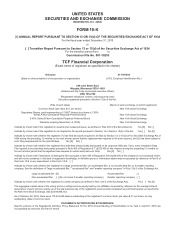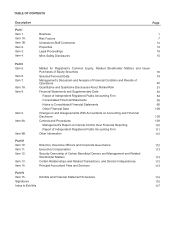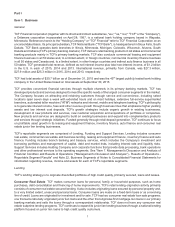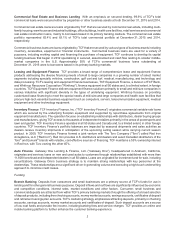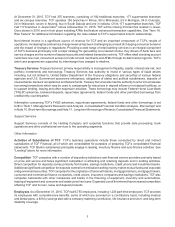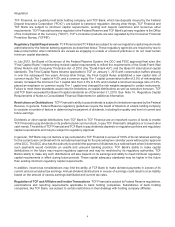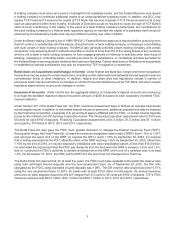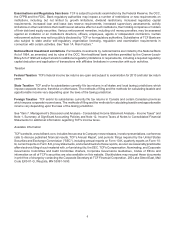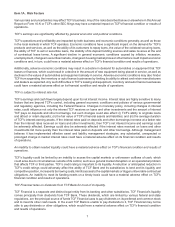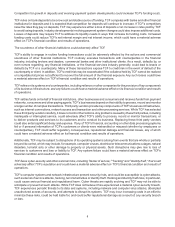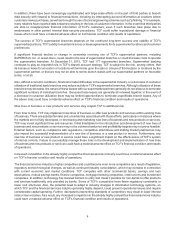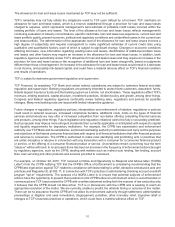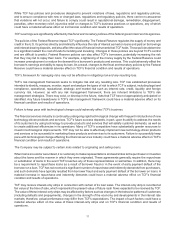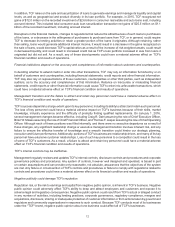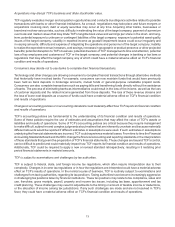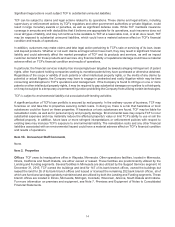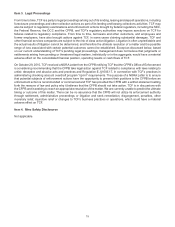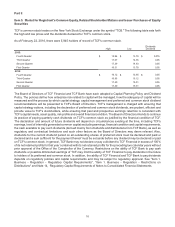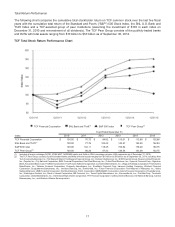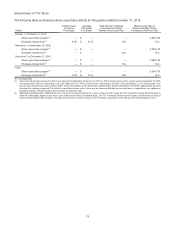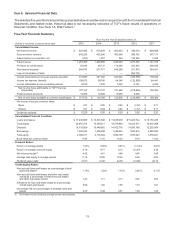TCF Bank 2015 Annual Report Download - page 24
Download and view the complete annual report
Please find page 24 of the 2015 TCF Bank annual report below. You can navigate through the pages in the report by either clicking on the pages listed below, or by using the keyword search tool below to find specific information within the annual report.9
In addition, there have been increasingly sophisticated and large-scale efforts on the part of third parties to breach
data security with respect to financial transactions, including by intercepting account information at locations where
customers make purchases, as well as through the use of social engineering schemes such as "phishing." For example,
many retailers have reported data breaches resulting in the loss of customer information. In the event that third parties
are able to misappropriate financial information of TCF's customers, even if such breaches take place due to
weaknesses in other parties' internal data security procedures, TCF could suffer reputational damage or financial
losses which could have a material adverse effect on its financial condition and results of operations.
The success of TCF's supermarket branches depends on the continued long-term success and viability of TCF's
supermarket partners, TCF's ability to maintain licenses or lease agreements for its supermarket locations and customer
preferences.
A significant financial decline or change in ownership involving one of TCF's supermarket partners, including
SUPERVALU Inc. or Jewel-Osco, could result in the loss of supermarket branches or could increase costs to operate
the supermarket branches. At December 31, 2015, TCF had 177 supermarket branches. Supermarket banking
continues to play an important role in TCF's deposit account strategy. TCF is subject to the risk, among others, that
its license or lease for a location or locations will terminate upon the sale or closure of that location or locations by the
supermarket partner, or that we may not be able to renew branch leases with our supermarket partners on favorable
terms, or at all.
Also, difficult economic conditions, financial or labor difficulties in the supermarket industry, or a decrease in customer
utilization of traditional bank branches may reduce activity in TCF's supermarket branches. Although utilization of these
branches may decrease, the nature of these leases with our supermarket partners generally do not allow us to terminate
significant numbers of individual branches. Because these leases are generally all renewed together, in the event of
a decrease in customer utilization there may be limited opportunities to terminate unprofitable branch leases. Any of
the above risks could have a material adverse effect on TCF's financial condition and results of operations.
New lines of business or new products and services may subject TCF to additional risk.
From time to time, TCF may implement new lines of business or offer new products and services within existing lines
of business. There are substantial risks and uncertainties associated with these efforts, particularly in instances where
the markets are not fully developed. In developing and marketing new lines of business and new products or services,
TCF may invest significant time and resources. Initial timetables for the introduction and development of new lines of
business and new products or services may not be achieved and price and profitability targets may not prove feasible.
External factors, such as compliance with regulations, competitive alternatives and shifting market preferences may
also impact the successful implementation of a new line of business or a new product or service. Furthermore, any
new line of business or new product or service could have a significant impact on the effectiveness of TCF's system
of internal controls. Failure to successfully manage these risks in the development and implementation of new lines
of business and new products or services could have a material adverse effect on TCF's financial condition and results
of operations.
Increased competition in the already highly competitive financial services industry could have a material adverse effect
on TCF's financial condition and results of operations.
The financial services industry is highly competitive and could become even more competitive as a result of legislative,
regulatory and technological changes, as well as continued industry consolidation, which may increase in connection
with current economic and market conditions. TCF competes with other commercial banks, savings and loan
associations, mutual savings banks, finance companies, mortgage banking companies, credit unions and investment
companies. In addition, technology has lowered barriers to entry and made it possible for non-banks to offer products
and services traditionally only provided by banks. Some of TCF's competitors have fewer regulatory constraints or
lower cost structures. Also, the potential need to adapt to industry changes in information technology systems, on
which TCF and the financial services industry generally highly depend, could present operational issues and require
considerable capital spending. Further, decreased underwriting standards of competitors may result in lower interest
rates or loan volumes. As a result, any increased competition in the already highly competitive financial services industry
could have a material adverse effect on TCF's financial condition and results of operations.


